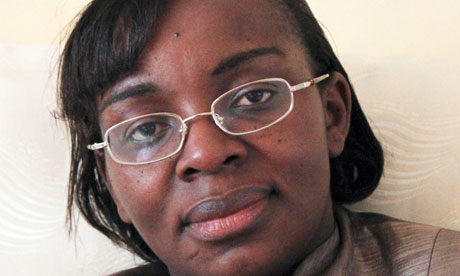Rwandan opposition politician jailed for eight years

By Jenny Clover
KIGALI | Tue Oct 30, 2012 10:00am EDT
(Reuters) - Rwanda's high court on Tuesday sentenced a leading opposition politician to eight years in prison, in a case linked to the 1994 genocide and seen as a test of the judiciary's independence.
Victoire Ingabire, leader of the unregistered FDU-Inkingi party, had faced six charges and was found guilty of two: conspiring to harm the country through war and terror and minimizing the genocide.
Ingabire had pleaded not guilty. She was accused of transferring money to FDLR Hutu rebels and of questioning why no Hutu victims were mentioned in a genocide memorial.
More than 800,000 people were killed in the central African country when an ethnic Hutu-led government and ethnic militias went on a 100-day killing spree in April 1994, indiscriminately killing Tutsis and moderate Hutus.
Ingabire, a Hutu, returned to Rwanda in January 2010 from exile in the Netherlands to contest presidential elections but was barred from standing after being accused of crimes linked to genocide denial. The vote was won overwhelmingly by President Paul Kagame.
In mid-April this year, Ingabire began to boycott the trial, saying her "trust in the judiciary has waned".
Iain Edwards, Ingabire's British lawyer, argued that the evidence against her was fabricated and that some of the charges were against Rwanda's constitution.
On Tuesday, Edwards said Ingabire would appeal the verdict.
"I'm not surprised, (but I am) disappointed. I firmly believe that she should have been acquitted of all of the counts on the indictment," he told reporters.
"But we will go to appeal on what it is that she has been convicted of."
Ingabire was arrested by Rwandan police on October 14 after they said investigations into a former rebel commander facing terrorism charges had also implicated her.
Kagame's final presidential term expires in 2017. He has led his country's recovery from the 1994 genocide, receiving praise for his efforts to transform Rwanda into a middle-income country by 2020.
However critics accuse him of being authoritarian and trampling on media and political freedoms.
(Reporting by Jenny Clover; Writing by James Macharia; Editing by Andrew Roche)
